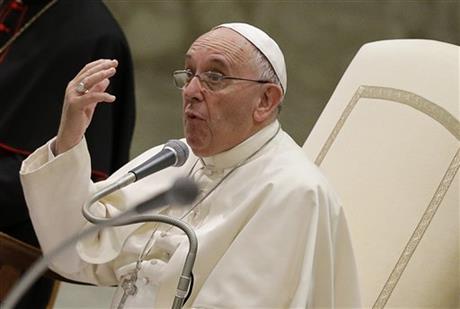
By ANDREW TAYLOR
A political pope is sure to seize his opportunity when he addresses a political body. So both Democrats and Republicans are looking forward to Pope Francis’ remarks to Congress next month — and bracing for them, too.
The pope thrills Democrats with his teachings on climate change, social justice and immigration. At the same time, his message on life and the Catholic Church’s traditional opposition to abortion comfort Republicans.
There is genuine giddiness among Catholic Democrats — many of whom have long been uncomfortably at odds with their church over abortion rights — about the pope’s strong emphasis on addressing poverty and the environment.
“I’ve been waiting for this pope all my life,” said liberal Massachusetts Democrat Jim McGovern, 57. “I find him inspirational and I know a lot of other people do, not just Catholics.”
The pope comes to the Capitol on Sept. 24, where he will be the first pontiff to ever address a joint meeting of Congress. He will also appear on a West Front balcony to greet the public.
There’s little doubt that Francis, who in a speech last month in Bolivia spoke out against unchecked capitalism before an assemblage of groups representing the poor, will seek to send a similar message to lawmakers representing the richest nation on earth.
“Whether it’s climate change or hunger or taking care of the poor, the Pope’s message is really the embodiment of what Catholic social teaching has been about, historically,” said Rep. Rosa DeLauro, D-Conn., who traveled to Rome to witness the pope’s installation two years ago.
The pope was, of course, invited by the most powerful Catholic in Congress, House Speaker John Boehner, R-Ohio., who will be accompanied by Vice President Joe Biden, another Catholic, in familiar seats behind Francis on the dais. House Democratic leader Nancy Pelosi of California, also a Catholic, will occupy a prominent seat on her party’s side of the aisle.
For joint addresses like the State of the Union or even the recent appearance before Congress by Israeli Prime Minister Benjamin Netanyahu, partisan politics is unavoidable. One side will jump to their feet while the other will sit on their hands. In September, however, most hope and anticipate such grandstanding can be avoided.
“You will not know it’s the Congress,” said Rep. Bill Pascrell, D-N.J.
There’s also no glad-handing the pope as he walks down the center aisle, unlike the annual ritual in which lawmakers such as Eliot Engel, D-N.Y., and Sheila Jackson Lee, D-Texas, commandeer a seat to press the flesh. The pontiff is expected to keep his hands clasped as if in prayer.
A top adviser to Francis visited Washington in April and said the pope will speak “frankly but friendly” in his U.S. trip.
“Even the Congress people can listen to other voices, to counsels, to advisers,” said Honduran Cardinal Oscar Rodriguez Maradiaga, according to Religion News Service. “The one who receives advice commits less errors and is not mistaken. The one who does not like to listen to advice will have a lot of trouble. So I think the Congress will receive very well the advice (of the pope) — even if there are some things that will not be comfortable.”
Francis’ recent encyclical chastised policymakers across the globe for inaction on the environment as the skies warm and the oceans are ravaged by overfishing and pollution.
“We may well be leaving to coming generations debris, desolation and filth,” the pope wrote, mincing no words. “The pace of consumption, waste and environmental change has so stretched the planet’s capacity that our contemporary lifestyle, unsustainable as it is, can only precipitate catastrophes.”
In September, such warnings could be seen as a challenge directed to a Congress populated by GOP skeptics of proposals to reduce greenhouse gases like new curbs on coal-fired power plants.
“You’re always stronger in terms of credibility when you stay closer to your church doctrine and church teaching and also what the Catholic Church has been about,” said Sen. Dan Sullivan, R-Alaska. “Many people take a lot of pride, whether you’re Catholic or not, in terms of focus on the poor, focus on helping the most vulnerable.”
Francis, however, is not shy about expanding his reach beyond a traditional role as he leads the church in a rapidly changing century.
“He’s a very different pope. He’s defined himself in a very different way,” said Sen. Thom Tillis, R-N.C., another Catholic. “He’s talking about outcomes. We’ve got to work on means.”
The recent encyclical also reiterated the church’s longtime teachings on abortion.
“How can we genuinely teach the importance of concern for other vulnerable beings, however troublesome or inconvenient they may be, if we fail to protect a human embryo, even when its presence is uncomfortable and creates difficulties?” Francis wrote.
Whatever the pope’s message, lawmakers in both parties hope it serves as a salve — however temporary — to a body that too often sees issues in black and white and seeks partisan advantage wherever it can be found.
“The teachings of the Catholic Church don’t fit neatly into either the Democratic or the Republican Party,” said Rep. Dan Lipinski, D-Ill. “And I think that leads oftentimes to a fight on both sides over — now that we have a very popular pope — who is going to turn that to their political advantage. I hope that we won’t see that.”



